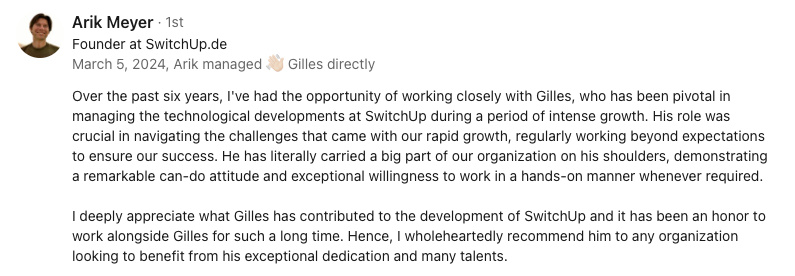Abstract:
The article discusses the essential role of Diversity, Equity, and Inclusion (DEI) in European tech startups, highlighting how these strategies not only comply with EU laws but also drive innovation and business success. By integrating DEI into hiring and business strategies, startups in sectors like SaaS, fintech, and AI enhance creativity, expand market reach, and improve team collaboration. Real-world examples include SaaS companies fostering innovation through diverse teams and fintech startups expanding market reach by reflecting customer demographics. DEI is embedded in business strategies, as seen in a cybersecurity startup in Paris and a fintech firm in Berlin, where leadership plays a crucial role in advancing DEI initiatives. Despite challenges like resource constraints and regulatory differences, startups leverage creative solutions and EU frameworks to strengthen DEI efforts, gaining a competitive advantage. Embracing regional diversity and multiculturalism also enriches DEI strategies, allowing startups to cater effectively to diverse markets. The article argues that DEI is not merely a trend but a fundamental element that can unlock a startup's potential for growth and innovation in the competitive European tech landscape.
In the bustling world of European tech startups, focusing on diversity, equity, and inclusion (DEI) is more than just a passing trend—it's essential. Many startups are striving to create inclusive environments that not only meet EU rules but also enhance business success. If you're part of this vibrant sector, you might wonder how to integrate DEI into your work to spark innovation and reach more markets. Fortunately, numerous startups have successfully tackled these challenges, illustrating how DEI can drive growth and innovation. Let's explore how these efforts are transforming the European tech scene and why they might be the key to unlocking your startup’s potential.
Successful DEI Strategies in European Tech Startups
Diversity, Equity, and Inclusion (DEI) are integral to how tech startups in Europe operate. These efforts not only comply with EU laws but also improve business outcomes. Here are some examples of how different startups have successfully adopted DEI strategies.
Fostering Innovation in SaaS Companies
In the Software as a Service (SaaS) sector, startups that emphasize DEI in hiring have seen remarkable results in innovation. By bringing together diverse perspectives in product development teams, these companies boost creativity and create solutions that better serve a global audience. From my experience in tech entrepreneurship, I recall my time in Berlin, where diverse teams often led to unexpected but valuable insights that shaped product design and development. Reports from Atomico and McKinsey also highlight how diverse teams drive innovation. Making DEI a part of hiring processes is a strategic way to enhance team skills and creativity.
Expanding Market Reach through DEI in Fintech
In fintech, DEI initiatives are crucial for expanding market reach and improving customer engagement. By building teams that reflect the varied demographics of their customers, fintech startups tailor services to meet diverse client needs. In Berlin, I observed how diverse teams could connect with broader audiences, helping startups enter new markets and strengthen customer relationships. Research from the Boston Consulting Group supports this, showing diverse teams can improve customer understanding and expand market opportunities. Specific insights from these studies indicate that fintech companies with diverse leadership teams have a 19% higher revenue from innovation.
Improving Collaboration in AI Companies
AI companies benefit from diverse workforces by enhancing team collaboration and problem-solving. These companies use diverse teams to tackle complex challenges, creating environments where different perspectives are essential. The Harvard Business Review highlights how diversity can enhance teamwork and lead to better solutions. During my time working with an AI startup, I saw firsthand how DEI strategies were key in fostering teamwork and innovation. This personal experience underscores the importance of diverse perspectives in driving effective collaboration.
These examples demonstrate that DEI initiatives have impacts beyond immediate benefits, driving significant business outcomes across different sectors.
Strategic Integration of DEI in European Tech Startups
Embedding DEI in Business Strategy
Integrating DEI into business strategy is crucial for European tech startups, shaping values and guiding decisions. For example, a cybersecurity startup in Paris incorporated DEI into its mission, making inclusivity a core part of its culture. This affects everything from hiring to product development, ensuring all strategic decisions reflect a commitment to diversity. By embedding DEI into their values, startups not only create inclusive environments but also meet societal expectations, strengthening their strategic direction.
Leadership plays a vital role in advancing DEI, making it a priority within startups. A fintech company in Berlin set an example by initiating DEI training programs and mentorships. Such top-level commitment ensures DEI practices are present at all organization levels. Leaders understand that without their involvement, DEI efforts might not succeed, highlighting the importance of leadership in these initiatives.
Aligning DEI with product development and customer strategies has proven beneficial for many startups. A software company in Lisbon linked DEI with its product process, ensuring products appeal to diverse demographics. This approach has increased customer engagement as diverse perspectives help meet the needs of users worldwide. By integrating DEI into business and product strategies, startups can innovate and expand market reach.
Enhancing Product Development and Market Reach
Diverse teams are essential for product innovation and creativity. Consider a tech startup team with members from different cultural backgrounds, each bringing unique ideas. This diversity sparks creative thinking, leading to standout products. Research in the Harvard Business Review states such diversity in teams drives significant innovation, crucial for tech startups aiming to disrupt markets.
Case studies show effective DEI initiatives can lead to market expansion and a diverse customer base. A health tech company in London used DEI to better understand and enter international markets. By employing team members familiar with different cultures, the company expanded its reach and gained diverse clients, highlighting how DEI can lead to business growth.
DEI also helps create products that appeal to diverse consumer demographics. By prioritizing inclusivity in product design, startups make their offerings accessible and appealing to a broader audience. This approach not only meets diverse consumer needs but also builds loyalty and market appeal, providing a strategic advantage in competitive markets.
Overcoming Challenges in DEI Implementation
Implementing DEI strategies in tech startups can be challenging, but creative solutions can help overcome these hurdles.
Navigating Resource Constraints
Despite limited resources, many startups are using technology to implement DEI. AI-driven recruitment tools are changing how companies diversify their workforce without huge budgets. These tools help review resumes and assess candidates fairly, reducing bias in hiring. This method broadens the pool of candidates and supports DEI aims by creating a more inclusive hiring process, making a big impact without a large HR team.
Startups also find creative ways to maximize DEI impact with minimal spending. Instead of costly training, some use online resources for DEI education. Employee-led efforts like mentorships and diversity committees require little investment but greatly enhance workplace inclusivity. Addressing talent retention, startups can foster a supportive culture that values diversity, which is crucial for retaining top talent.
Adapting to Regulatory Differences
Navigating EU regulations is another challenge for startups implementing DEI strategies. However, aligning with EU laws like the Equal Treatment Directive and GDPR offers advantages. Ensuring DEI initiatives comply with these laws not only avoids legal issues but also fosters an inclusive work environment. Understanding and integrating these regulations into daily operations shows a commitment to fairness and equity.
Some startups have successfully aligned their DEI strategies with EU directives, setting an example for others. For example, a digital marketing startup in Amsterdam integrated GDPR-compliant processes to handle data responsibly and inclusively. By following these standards, they minimized legal risks and built trust among employees, demonstrating how strategic regulatory alignment can strengthen DEI initiatives.
Leveraging EU Frameworks for Competitive Advantage
Harnessing EU Directives for Enhanced Reputation
Aligning DEI with EU directives can boost a startup's brand and reputation. By following regulations like the Equal Treatment and Racial Equality Directives, tech startups create inclusive environments and showcase ethical practices. This builds a trustworthy brand image, crucial in a competitive market. As customers and investors prefer businesses reflecting their values, startups prioritizing DEI within EU frameworks can gain a competitive edge and lead in ethical business.
- Following EU regulations like the Equal Treatment Directive helps create inclusive environments.
- Ethical practices enhance brand trustworthiness, crucial in competitive markets.
- Startups aligning with EU frameworks gain a competitive edge and attract value-driven customers and investors.
Utilizing EU Funding to Propel DEI Efforts
Regional diversity advances DEI strategies with the help of EU funding. Programs like Horizon Europe provide financial support to startups integrating diversity and inclusion. This funding helps implement DEI initiatives, giving access to resources needed for growth. By aligning with EU funding, companies strengthen their finances and show commitment to inclusivity, positively affecting operations. For instance, a startup that received Horizon Europe funding was able to launch a successful DEI training program, demonstrating the practical benefits of such financial support.
Embracing Regional Diversity for DEI Enrichment
Leveraging regional diversity enhances DEI strategies in tech startups. Europe's multicultural landscape offers diverse perspectives that can strengthen DEI efforts. Startups integrating regional diversity into their culture unlock benefits like improved creativity and innovation. By embracing Europe's cultural insights, startups build strong DEI frameworks that resonate with diverse communities, driving success globally.
Multiculturalism and Regional Diversity
Cultural Norms Shaping DEI Strategies
Cultural norms greatly influence DEI strategies. Different European regions have unique practices shaping DEI approaches. For example, Scandinavian countries emphasize collaboration, leading to team-based DEI initiatives, unlike more hierarchical methods elsewhere. Understanding these cultural nuances is essential for tech startups to create effective and culturally sensitive DEI strategies that foster team harmony and inclusivity.
Navigating the Multilingual Workforce
Language diversity presents challenges and opportunities in a multilingual workforce. While it can cause misunderstandings, it also enriches dialogue and perspectives. Tech startups can turn this to their advantage by offering language support and using multilingual tools, enhancing inclusivity and collaboration. By creatively addressing these challenges, startups maximize the strengths of their diverse workforce, leading to a cohesive, dynamic culture.
Inclusive Product Development for Diverse Needs
Inclusive product design is crucial for meeting diverse consumer needs. Consider a startup developing tech solutions accessible to users of different abilities and backgrounds. This approach expands market reach and demonstrates a commitment to inclusivity that resonates widely. By adding features like multilingual interfaces and culturally adaptive elements, startups make their products more appealing, boosting user satisfaction and loyalty. These examples show how thoughtful DEI strategies lead to successful products that cater to diverse markets.
In the dynamic European tech startup scene, embracing DEI is more than a strategic advantage—it's a driver of innovation and growth. Real-world examples show how DEI initiatives boost creativity in SaaS companies, expand market reach in fintech, and improve collaboration in AI firms. By embedding DEI into their core strategies, startups align with EU regulations and create inclusive workplaces that appeal to global audiences. This approach meets diverse consumer needs and positions startups for success in competitive markets. How might you integrate DEI into your work environment to foster a more inclusive and innovative team? Let's continue the conversation about how DEI can shape the future of tech.














